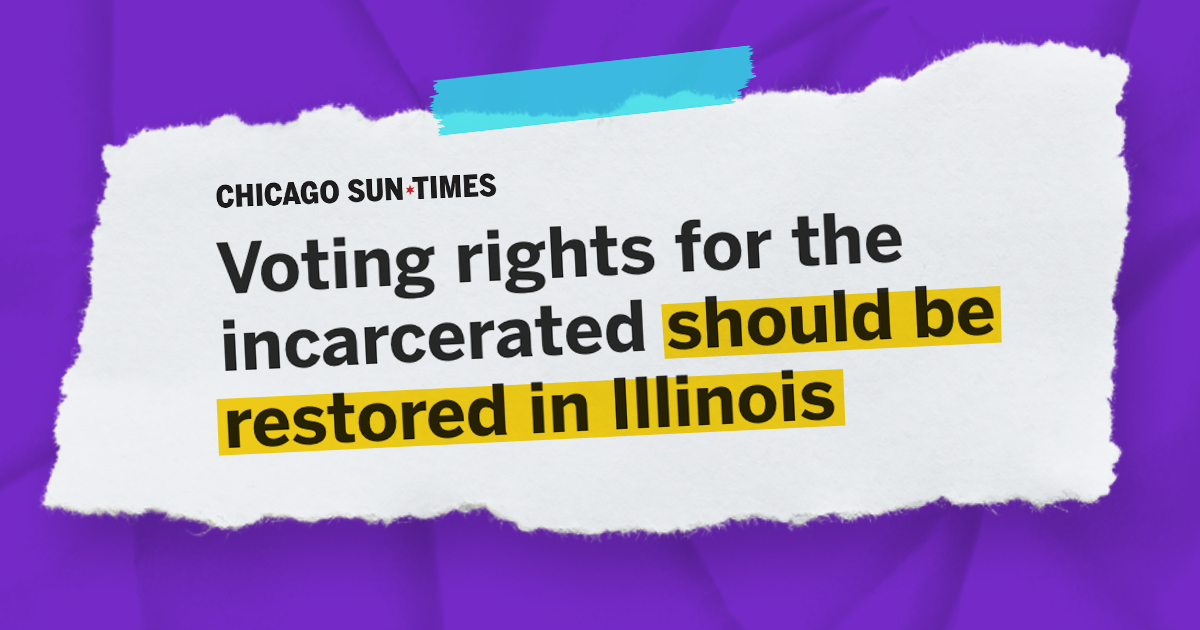Avalon Betts-Gaston on Voting Rights in Illinois

I have always been an advocate for others.
Whether it was advocating for the shy kid in class or protesting the apartheid in South Africa, I’ve always been in the fight. My grandparents taught me about the importance of mutual aid and supporting your community. We were the house on the block you could go to for help.
But, in 2015, it was time to fight for myself.
I was convicted of wire fraud—though I maintain my innocence—and started a sentence of four years in federal prison—away from my family, my children, my career as an attorney and an ordained minister and my community.
I can’t begin to describe the isolation and trauma that someone endures being incarcerated. It is incomprehensible. There wasn’t a day that went by when I didn’t experience or witness sexual, physical or verbal assault and abuse—with no way to hold the lawmakers, judges, or even facilities accountable with my vote.
Malcolm X once said: “The most neglected person in America is the Black woman,” and behind prison walls, that was especially true.
We were mothers, daughters and caregivers. We were the backbone to our communities.
And, yet, we were disenfranchised.
We weren’t able to vote in critical elections or voice the concerns of our families or communities. We were treated like second-class citizens.
Illinois lawmakers had a chance to change that this week during the veto session by passing SB 828, legislation to restore the voting rights to incarcerated citizens. That didn’t happen, but lawmakers can still make our state a national leader in democracy by passing legislation in 2023 for the nearly 30,000 Illinoisans unable to vote because of felony disenfranchisement during the upcoming lame duck session.
When I was released, I knew the first thing I needed to do was lend my voice to the fight. I began leading the IL Alliance for Reentry & Justice and Chicago Votes Unlock Civics coalition and started to share my story and fight against the misconceptions about people who are incarcerated.
Research shows that 76% of Black women who are incarcerated serve as the primary caregivers for their children. Thousands of Black mothers in Illinois, who know their children’s needs best, are being cut out of important decisions that impact their children—from public safety and gun violence to access to clean water and parks. These aren’t theoretical issues, either. Recent reports of lead in Chicago’s drinking water are particularly concerning, and parents should be able to vote to keep their children safe no matter where they are.
For my children—young, Black and residents of the Chicago area—voting for their safety, schools and investment in their futures is vital.
Arguments against voting rights restoration have no merit. I hear all the time that incarcerated Americans don’t deserve to have a voice in their community. As a mother, you always deserve a voice to advocate for your children and their community. However, the argument that I hear the most: people who are incarcerated don’t want to vote. This couldn’t be further from the truth.
Anyone who has been incarcerated will tell you that the three biggest nights in the TV room were movie night, championship night, and election night. If you didn’t reserve your seat, you weren’t getting in. And leading up to the election, the library’s copies of the local newspapers were checked out in seconds.
We wanted the news. We wanted candidates to make us feel like valued citizens. And, more than anything, we wanted to vote—just like everyone else.
In every election since 2004, approximately 5 million Americans are disenfranchised by state laws that prevent people with felony convictions from voting. Depending on the state, people may be denied the right to vote during some or all of their sentence or for the rest of their lives. Only Maine, Vermont, Washington D.C. and Puerto Rico allow incarcerated people to vote. Even more people are disenfranchised because of confusion around eligibility laws, which vary by state and often are misinterpreted even by government officials. In Illinois, there are nearly 30,000 individuals who are disenfranchised due to a felony conviction. That’s unacceptable.
Recent polling by Stand Up America and other progressive organizations advocating for voting rights restoration shows that the majority of voters believe voting should be a guaranteed right for all citizens 18 and older, including the currently incarcerated. I’m grateful that Illinois is working towards becoming the first state to proactively restore voting rights to all eligible citizens in the state.
Right now, we have the chance to make history and lead the nation on this issue. This fight is led by impacted individuals and young people who understand the tide is changing and Illinois must be at the forefront. We won’t stop fighting until every American adult is able to vote for their community and family no matter where they lay their head at night.
Avalon Betts-Gaston is a Chicago native, non-licensed attorney, ordained minister, and the project manager at Illinois Alliance for Reentry & Justice. This op-ed was originally published in the Chicago Sun-Times. You can read it here.
Ready to take action? In two clicks, contact your legislators and urge them to support SB 828/HB 1872: